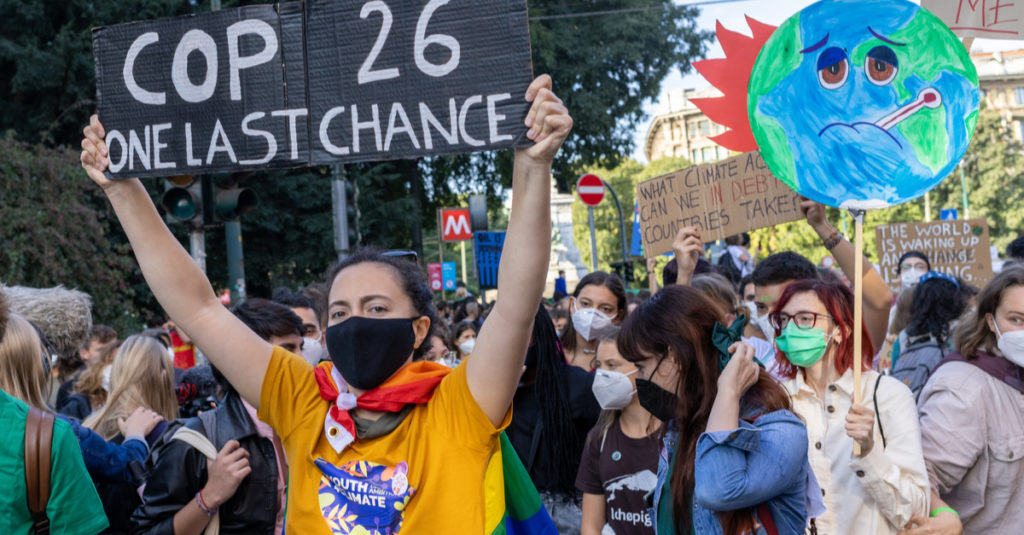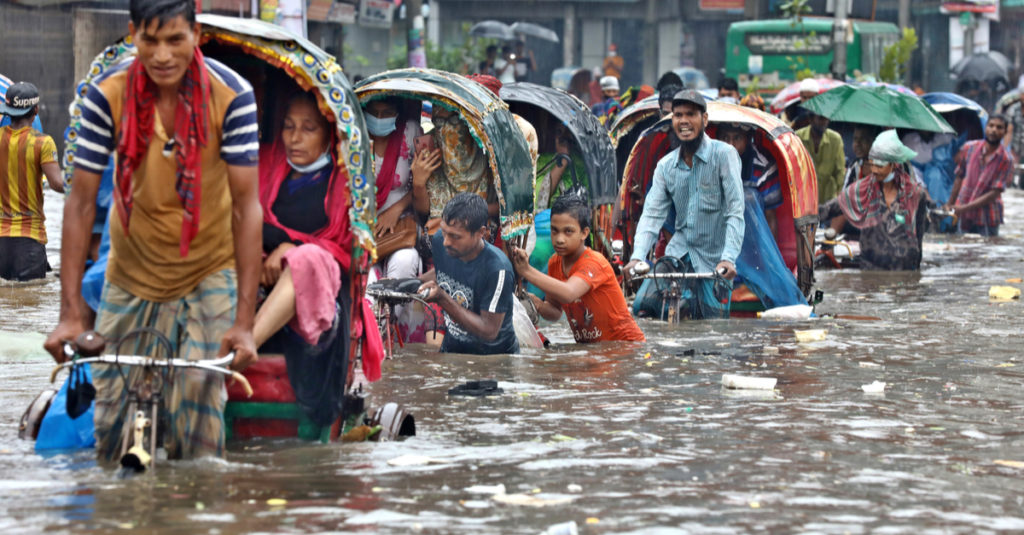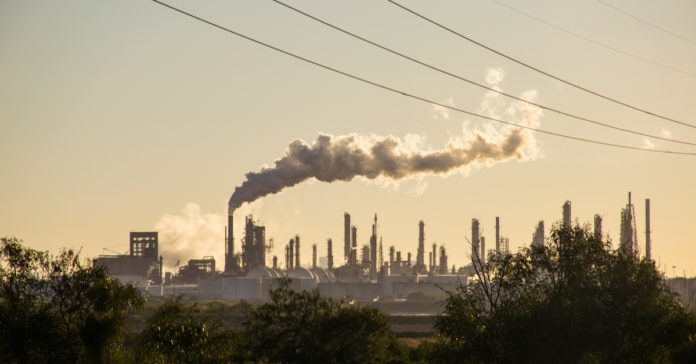As world leaders attend the COP26 summit in Glasgow, Abdul Wahid, chairman of Hizb ut-Tahrir Britain, asks where is the voice of the Ummah in this conversation?
We’ve been told this is a watershed moment; that it is one minute to midnight; that unless we act now, there will be an irreversible environmental catastrophe.
And given that we saw floods, forest fires and fuel crises hit the headlines in the months running up to COP26, one can understand the agitation and urgency many people feel – such that middle class working people are sticking themselves to roads with glue to highlight their concerns.
But let’s take a look from another perspective.
COP26’s sponsors and partners include Google, Microsoft, Unilever and some big energy providers. The United States and Britain are two of the biggest voices screaming for change – yet historically these states have been the biggest polluters. They have industrialised and developed using fossil fuels, yet are now calling for a change that will disproportionately affect others.
One would be naive not to question the motives of this conference and all we have heard from politicians Boris Johnson and Rishi Sunak – as well as the establishment media – about the narrative of this conference and their proposed solutions.
If the delegates really cared about the planet as much as they say, how come so many arrived on private jets? How come Jeff Bezos is given a platform to speak as an honoured guest only days after he helped put 90-year old William Shatner into space for nothing more than a very environmentally-unfriendly joy ride?
Subscribe to our newsletter and stay updated on the latest news and updates from around the Muslim world!
When examining motives one cannot ignore national interest and geopolitics. For the United States, climate change and fossil fuels become another useful stick with which to beat their closest rival, China.
For the developed, industrialised western states like Britain and Europe, it is about several things – including energy security (they really don’t want to have to rely on Putin for their gas), as well as trying to get a head start in the future green economy.
The many tens of trillions of dollars that will be spent on this “war on net zero” will usher in deeper and ever more oppressive tax regimes. Sadly, these are the real issues – and as such we cannot look to this group of leaders to help humanity out of this crisis, anymore than they have helped during the global pandemic.
Is there a problem?
Let me be clear. I am not denying there is a problem. Even if you look critically at the “scientific consensus” (and you should, because it is a flaw in the modern world that people treat scientific opinion like it is revelation from the heavens), it is hard to ignore the fact that human activity is harming this planet – and consequently harming people.
Indeed, one could argue there are two environmental problems.
One, the subject of all the political and media attention – is about climate change and the scientific modelling that predicts (within significant margins of error) rising temperatures and sea levels that will affect people at some future date. In summary, the solutions to this emphasise that we as individuals have to change; to recycle more of our waste; to use electricity from renewable sources, not from gas; to drive electric cars, and buy from companies that are more carbon neutral.
These are what George Monbiot calls “micro-consumerist” changes. The responsibility for change has been left to us as individuals, whilst corporate business from the energy sector to retailers have been told that they need to do more to provide the consumer with the green products and services they desire; and if they innovate with more energy efficient technology they can enjoy the same profits, or even more, whilst reducing their carbon footprint.
But the root cause is hardly addressed in the mainstream discourse. That is, that the problem lies with capitalism – the system that markets values, not just products and services, to us as consumers; that encourages us to believe we all need the latest phone, car, fashions and so on, or else our lives aren’t quite complete.

Most of all it is the system that has an embedded imperative for economic growth. Companies and states alike have to grow economically-speaking or die. The interest-based financial system demands this. Democratic politicians legislate the frameworks that serve corporate interests. People consume more. Companies produce more. Investors profit more. But all of this requires materials and energy and produces waste.
Whilst we may welcome small changes people make in their own lives, or more efficient technology, until there is an alternative to this system, all the proposed solutions are unlikely to succeed. They are trying to treat lung cancer by smoking cigarettes, only with slightly better filters.
The other environmental problem is not some future possible scenario, but is happening day in day out, affecting ordinary people. These are problems caused by air pollution, water pollution and other political factors. The WHO estimates that seven million people a year die from air pollution. Delhi, Dhaka, Kabul, Karachi and Lahore regularly sit at the top of the list of cities with dangerously high pollutants. UNESCO says 2.4 billion people live without any form of sanitation, polluted water for human consumption, and that 90% of sewage in developing countries is discharged untreated directly into water bodies. This is aside from industrial waste polluting water.
These are matters where the causes are known – whether from factories, vehicles or poor infrastructure. They do not need global summits and a change in public opinion. They need political will to tackle these problems. They are, in the end, a result of poor governance that prioritises other things over the wellbeing of citizens – which is often a legacy of the colonial policies of the same capitalist states that claim they want action today, but show little urgency about tackling these problems at international conferences.
What is the role of Islam and Muslims?
It is tragic that the voice of an Ummah of around two billion people who live in some of the most energy-rich regions of the world counts for so little in these global discussions.
There are many Islamic texts addressing issues related to the environment – water, wastefulness, cleanliness, not doing harm, treating animals well, stewardship for the earth – but these are almost always discussed from the perspective that we as individuals need to change.

Yet Islam was revealed as a complete way of life – individual, societal and global. These texts form part of a whole system that has many aspects that address these contemporary issues – which define a distinct economic system; how to manage energy and other natural resources; how to address environmental harms at a societal level; the need for good governance to look after peoples’ affairs – and enforce regulation regarding environmental issues.
In the coming days Hizb ut-Tahrir in Britain will be publishing a paper on its website explaining Islam’s approach in this context.
What can be said is that if we try to act as individuals, swimming in a sea where the capitalist currents are strong, we will make very little difference to the current situation. Rather, we need to understand that Islam has a distinct approach to capitalism.
Allah’s Messenger (ﷺ) said:
إِنَّ الدُّنْيَا حُلْوَةٌ خَضِرَةٌ وَإِنَّ اللَّهَ مُسْتَخْلِفُكُمْ فِيهَا فَيَنْظُرُ كَيْفَ تَعْمَلُونَ فَاتَّقُوا الدُّنْيَا
Indeed the world is sweet and green (alluring) and verily Allah is going to install you as a vicegerent (khaleefa) in it in order to see how you act. So fear Allah regarding the world.” (Sahih Muslim)
And that fearing of Allah should be in respect of every aspect of our capability to offer humanity an alternative.






















